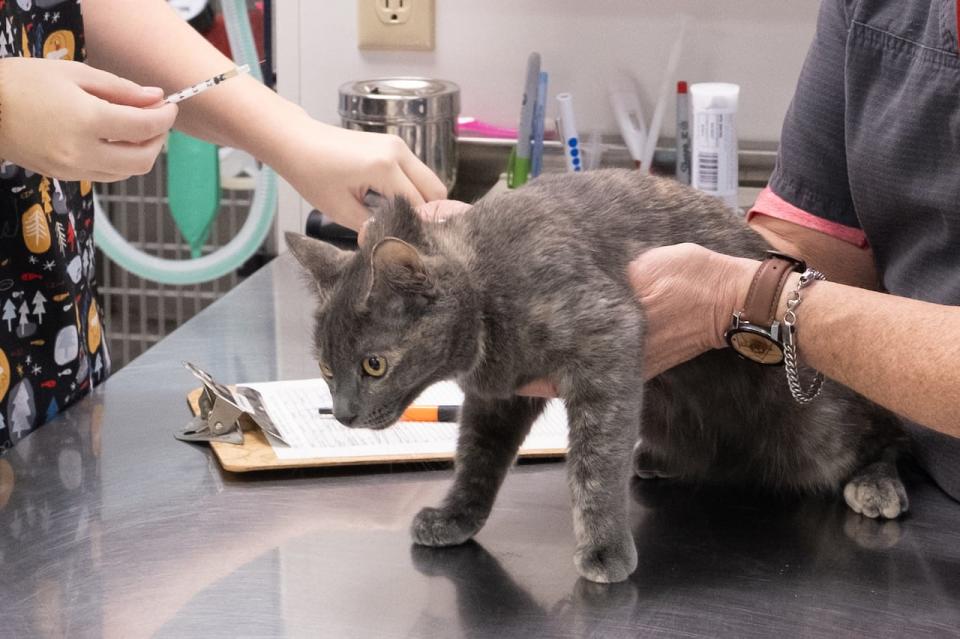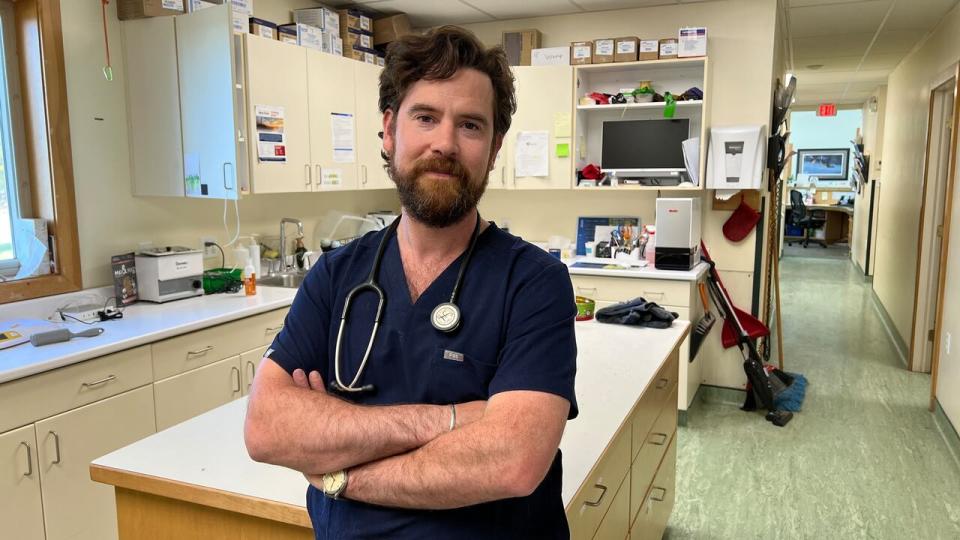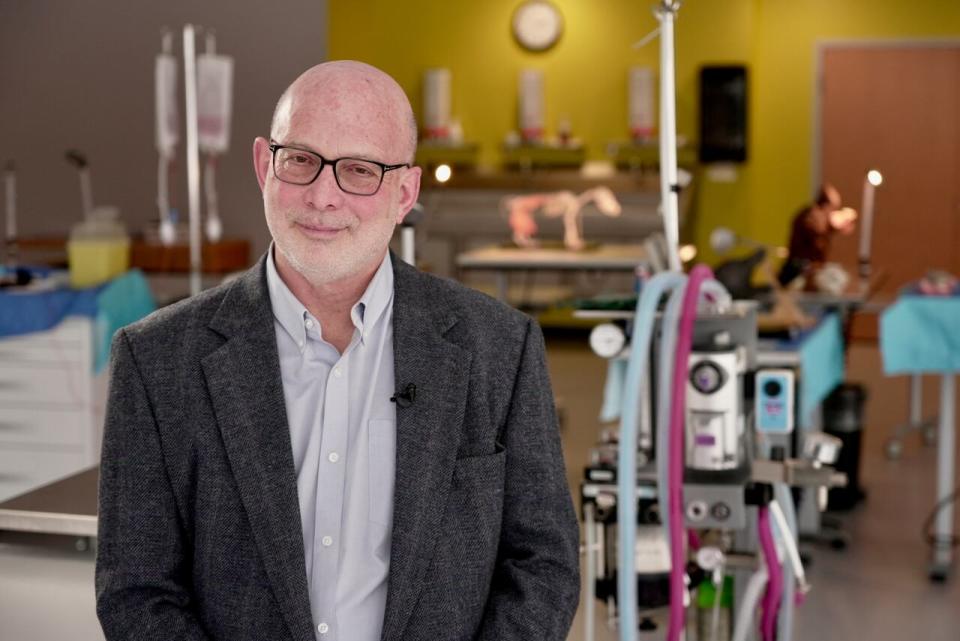Corporations are buying local vet clinics — raising questions about price, choice and quality of care

Dr. Ryan Redgrave isn't a dying breed, but his kind aren't as common as they once were.
You see, Redgrave is an independent vet.
"It's a busy job in and of itself," he said, "and the running of a small business is challenging."
Redgrave owns Weste Animal Hospital in Lawrencetown, N.S., near Halifax.
After working there as an associate for four years, he bought the practice from his mentor in 2019.
He's lucky he could take it over because, for more than a decade, large and often international companies have been snapping up local clinics here and around the world, a trend that intensified in Canada a few years before the pandemic.
As those corporate chains keep expanding, questions come about who's in control of animal care, costs and the future of the independent vet.
The chains say they offer vets a healthy work-life balance and, to pets, the best care in modern facilities.
The big companies, known as consolidators, have bought hundreds of clinics from 2012 onwards, according to records and reports, across the country, because pets and vets are big money.
Sixty per cent of Canadians have a pet, according to a recent report from Mintel, a consumer research firm, and the country's vet practices pull in around $9.3 billion a year according to a 2023 report prepared for the Canadian Veterinary Medical Association.
How many corporate vets are there?
In Canada, vet consolidation has gone largely unnoticed amid a vet shortage and stories of vet burnout.
But the profession has been following the shift closely.
A 2023 report from the Ontario Veterinary Medical Association (OMVA) said corporate interests contol 20 per cent of veterinary hospitals in Canada, and estimates those chains employ about 40 per cent of the nation's vets.

Dr. Ryan Redgrave, a vet in the Halifax area, is concerned about how big companies have been buying up independent vet practices in Canada and around the world. (Paul Poirier/CBC)
In the Halifax area, for example, where Redgrave practises, CBC News checked out the 55 local clinics, finding 23 of them (42 per cent) are corporate-owned.
The way things are going worries him.
"The public's going to have less choice and I don't think that's a good thing," he said.
The three biggest veterinary operators in Canada, according to the OMVA report, are:
VetStrategy — which was founded in Canada but is now owned by a British company — with more than 360 clinics.
VCA Canada, owned by Mars Veterinary Health, with over 160.
NVA, which is owned by a German investment fund, with over 140.
Two much smaller chains, P3 Veterinary Partners and VetCare, are Canadian owned.
Many corporate chains buy only part of vet's practice, becoming co-owners.
VetStrategy, VCA Canada and NVA all declined CBC News requests for an interview.
Prices and competition
Canadians have been noticing changes in prices at vets in the past few years.
An Angus Reid survey found 60 per cent of consumers who took their pet to the vet for a routine checkup in 2022 said they felt they were charged too much. For urgent care, it rose to 71 per cent.
In a Calgary dog park, Laurie Peterson told CBC News she's on a budget but does her best "to pick independent" and has a vet she feels is affordable.
Nikki Ledrew said she also has an independent vet for her border collie, which is "very expensive, but worth it."

Concerns about competition prompted regulators in the U.K. to take action on large vet chains. (Anis Heydari/CBC)
Concerns about competition and price hikes have led to government action on the big chains.
In the U.K., the government regulator is investigating pet medicine pricing and competition between vet clinics because of reports showing the vet prices there went up more than the rate of inflation in 2023.
In the U.S. the Federal Trade Commission (FTC) forced NVA to sell some clinics when it was buying another small chain in 2022.
Late last year, FTC Chair Lina Khan expressed her concern about consolidators saying "we shouldn't have markets where larger businesses are muscling out smaller businesses," according to VIN News, a veterinary news service.
Canada's Competition Bureau says it has received complaints about the vet industry but could not comment on their nature or if an investigation is underway.

Dr. Jeffrey Wichtel, dean of the Ontario Veterinary College, says there will always be need for independent vet practices. (Craig Chivers/CBC )
Dr. Jeffrey Wichtel, dean of the Ontario Veterinary College at the University of Guelph, has been following corporatization.
"I don't believe consolidation is making pet care more expensive," he said, pointing to inflation, rising rents and higher salaries as clinics compete for vets and staff as key issues.
The profit motive vs. pet care
Tension between pet owners and vets over pricing can happen at any practice and be stressful for both parties.
But as corporate practices have become more common, vets themselves have raised concerns about the profit motive influencing exam and treatment recommendations.
Dr. Pamelar Hale is a vet in Atlanta and has worked in independent practices and as an executive for a corporate vet chain.
Hale says corporate vet chains have upsides like providing opportunities for younger vets to take on leadership roles.

Dr. Pamelar Hale is a vet in Atlanta who has worked in independent practices and for a corporate vet chain. (BJ The Photographer)
But with chains, she says she worries about corporate objectives getting in the way of quality care — like "this hospital needs to make $20,000 a week" and "let's break that down into how many pets and how much per pet that should be."
In a statement, the VetStrategy chain said all its veterinarians and technicians have "clinical freedom to recommend and provide care that is best suited to both an animal's medical needs and an owner's financial position."
Hale says vets can best protect clinical freedom as clinic owners.
She's spoken out about the importance of vets hanging on to some level of ownership in practices, saying it's essential to their integrity.
Is there a future for independent vets?
Witchtel says 40 per cent of his school's graduates go to work in corporate clinics, some because they don't want to worry about running a clinic.
But because corporate chains are willing to pay retiring vets more for their clinics, it's also harder for young vets to take over a practice.
Even so, Wichtel says he believes independent vets will remain a fixture in communities.
"I think there's always going to be a need for independent practices that offer something different," he said, adding in countries where the trend is more advanced, corporate practices have settled at about half the market.
And what are Redgrave's plans for when it's time for him to move on?
"It's my hope that I'll sell to a young veterinarian one day."

 Yahoo Finance
Yahoo Finance 